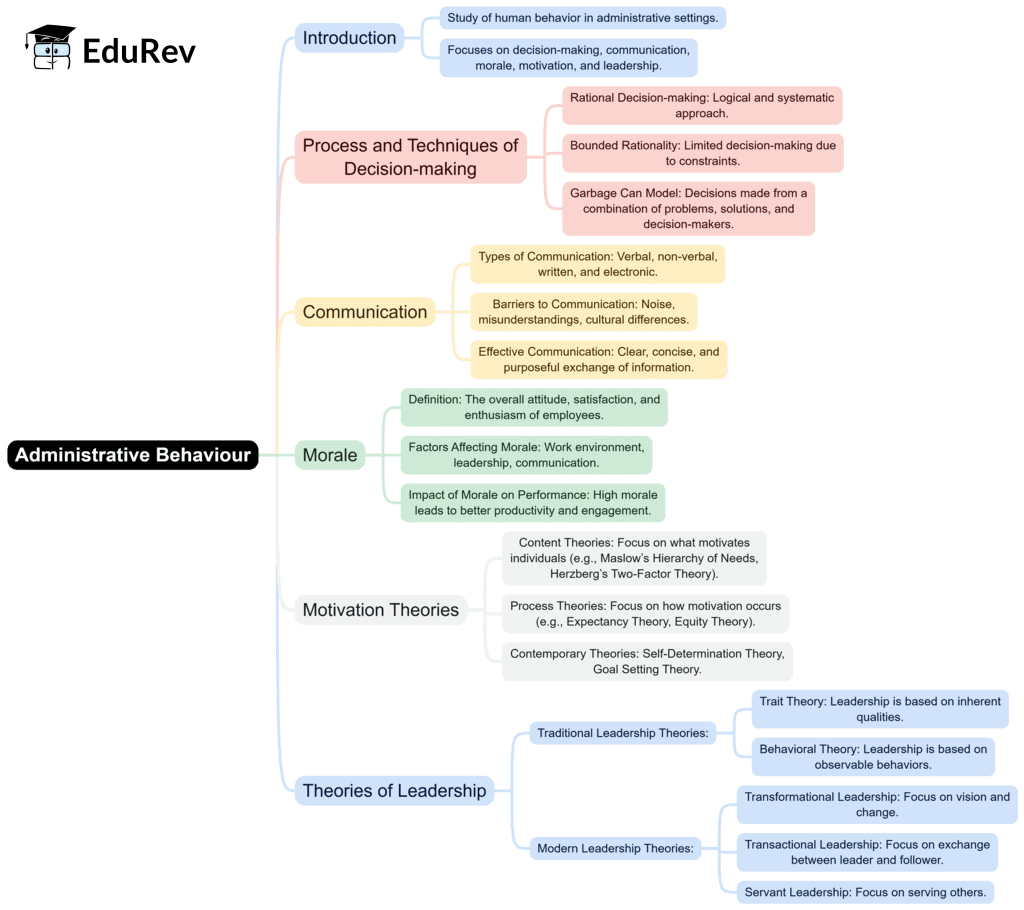UPSC Exam > UPSC Notes > Public Administration Optional for UPSC (Notes) > Mind Map: Administrative Behaviour
Mind Map: Administrative Behaviour | Public Administration Optional for UPSC (Notes) PDF Download

The document Mind Map: Administrative Behaviour | Public Administration Optional for UPSC (Notes) is a part of the UPSC Course Public Administration Optional for UPSC (Notes).
All you need of UPSC at this link: UPSC
|
58 videos|242 docs
|
FAQs on Mind Map: Administrative Behaviour - Public Administration Optional for UPSC (Notes)
| 1. What is Administrative Behaviour and why is it important for UPSC preparation? |  |
Ans. Administrative Behaviour refers to the study of how individuals and groups in organizations behave, particularly in contexts related to decision-making, leadership, and interpersonal relations. It is crucial for UPSC preparation as it helps candidates understand the nuances of public administration, which is a vital part of the syllabus. Understanding administrative behaviour aids in developing effective governance strategies and enhances analytical skills essential for civil services.
| 2. How does Administrative Behaviour relate to Public Administration in the UPSC exam? |  |
Ans. Administrative Behaviour is a key component of Public Administration, which is one of the subjects in the UPSC exam. It explores the dynamics of organizational behaviour, decision-making processes, and the roles of leadership within the public sector. Familiarity with these concepts allows candidates to analyze case studies effectively and apply theoretical knowledge to practical administrative scenarios during the exam.
| 3. What are the key theories of Administrative Behaviour that UPSC aspirants should study? |  |
Ans. UPSC aspirants should focus on several key theories of Administrative Behaviour, including the Classical Theory, Human Relations Theory, and Systems Theory. The Classical Theory emphasizes structure and efficiency, the Human Relations Theory focuses on the importance of human factors in organizations, and the Systems Theory highlights the interdependence of various organizational components. Understanding these theories provides a framework for analyzing administrative processes.
| 4. How can Administrative Behaviour be applied in real-world governance? |  |
Ans. Administrative Behaviour can be applied in real-world governance by improving decision-making processes, enhancing communication within organizations, and fostering a positive work culture. By understanding the behavioural dynamics of employees and stakeholders, public administrators can implement more effective policies, lead teams efficiently, and manage conflicts, ultimately contributing to better governance outcomes.
| 5. What are the common pitfalls in understanding Administrative Behaviour for the UPSC exam? |  |
Ans. Common pitfalls in understanding Administrative Behaviour for the UPSC exam include oversimplification of complex theories, neglecting the practical application of concepts, and failing to relate administrative behaviour to current events and case studies. Aspirants often overlook the importance of integrating theoretical knowledge with real-world examples, which can hinder their ability to answer analytical questions effectively in the exam.
Related Searches
















